-
THE GUN 銃 (Masaharu Take 2018)
MASAHARU TAKE: THE GUN 銃 (2018)
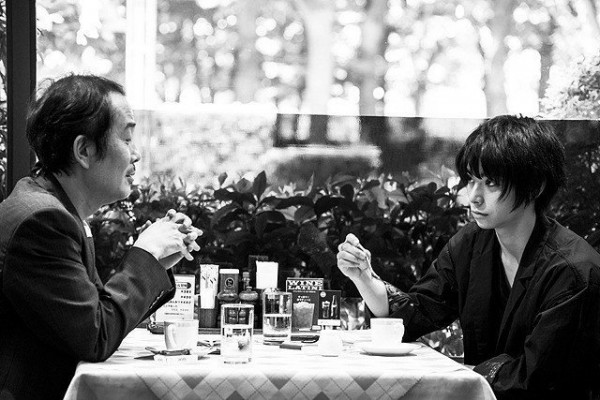
LILY FRANKY AND NIJIRO MURAKAMI IN THE GUN
Chekhov's gun rule observed
One senses a nihilistic streak in Japanese culture and aimless university student Toru Nishikawa (Nijir˘ Murakami) has one that gets a dangerous boost when he comes across a pistol by the riverside one night, takes it home, and begins polishing and admiring it. It's a handsome .357 magnum, and it's loaded with bullets. Toru lives alone. He has a pal at the fac, a cheerful boy in a pork pie hat who wants to join him in picking up babes, but Toru keeps his babes to himself. There's one for sex, the other, the emotionally delicate Yukio (Alice Hirose) he really cares about and is shy with. The gun makes Toru feel sexier.
Apparently it's okay to smoke everywhere in Japan, even on the subway. Toru lights up with the satisfying ka-ching of his Zippo every time he goes anywhere, the school cafeteria, cafes with the babes, after sex. We know that Toru, a foster child with little connection to his adopted parents, and here, a proven disinterest in his real father, would rather light up than express his feelings. A voiceover where he narrates helps us guess what's in his head, but just barely.
Next door to Toru's solitary apartment there is a time bomb. A woman moves in who is loudly abusive to her small son. The boy doesn't talk to anybody, but his pain shows to Toru when he leaves behind a plastic bag containing live crayfish with their legs torn off. Toru is watching the irresponsible mother, noting her habits, when she grocery-shops.
This screenplay by the director and Hideki Shishido is a kind of existential horror story. It's also stylish, style taking the place of morality or inner self-worth for the young existential protagonist. In fact Nijiro Murakami is a fashion plate. Waif-cute, a look that the popularity of skating superstar Yuzuru Hanyu showed appeals to Japanese women of all ages, as Toru Nijiro has anime hair and, for summer, wears long white open-top T shirts, loose white blouses, and a long half-length white smock like a lab coat, his slim jeans fashionably rolled at the bottom, black shoes immaculately invisible. Toru starts supplementing his sharp-looking, demonstrably empty day-pack with a black slung pouch containing the pistol, because he decides since he has it, he might as well start carrying it around. It feels so good to have it!
The whole idea of a weapon probably carries a frisson in relatively peaceable Japan that it would lack in the gun-crazy States.
Is it a surprise that somebody notices him when one night he shoots a cat, wearing his white smock, and, wildly excited, runs away from the scene? Soon an umbrella-toting detective shows up at Toru's door. .357 Magnums are a bit thin on the ground in Tokyo, and he left a bullet in the cat that matches the one in the dead man where Toru found the gun. The all-knowing visitor is played by the always excellent Lily Franky, who sets the parameters of the situation with crushing thoroughness in his words to the tight-lipped Toru when they adjourn to a coffee shop. To go out for this interview, Toru dons a black smock instead of the white one, but that doesn't fool the cop. The film suffers from a lack of options. But perhaps that is the point. For Toru, life is a dead end.
As Mark Hadfield noted in his Japan Times review, though The Gun is adapted from a the 2002 debut novel of Fuminori Nakamura, it would "feel familiar" simply if you're read Crime and Punishment or "the works of Albert Camus and Kobo Abe" - though, as Hadfield adds, this movie isn't on that exalted level. It's more simply a mood piece that plays with the sense that youths who aren't motivated at university or have good family backgrounds may be, as it were, loaded guns.
Hiromitsu Nishimura is responsible for the black and white cinematography, which goes well with Murakami's alternately black or white outfits. Sometimes the style seems the only thing, but as Hadfield notes, despite some "weak soundtrack choices," Take sustains a nice combination of tension and despair to the end. The Gun has the qualities of a good short story, and it could come back to haunt you.
The Gun 銃 (Jű), 98 mins., debuted at the Tokyo film festival Nov. 2, 2018 winning the Japanese Cinema Splash Best Director award; Nijir˘ Murakami won the Tokyo Gemstone award for his performance. The Japanese theatrical release was Nov. 17, 2018. Reviewed for Filmleaf as part of the NYAFF, where it has its North American debut.
Sunday, June 30
6:15 PM
Walter Reade Theater
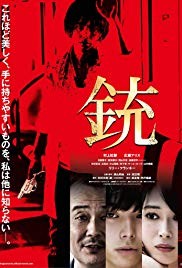
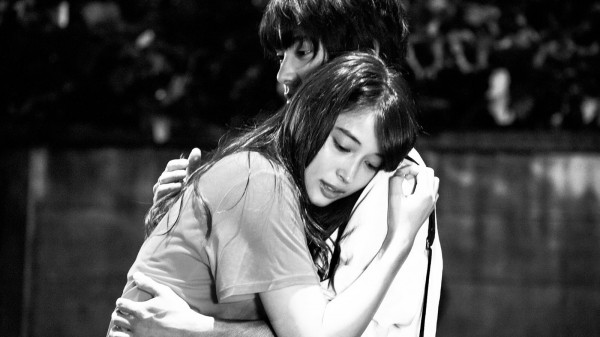
ALICE HIROSE AND NIJIRO MURAKAMI IN THE GUN
Last edited by Chris Knipp; 06-23-2019 at 12:58 AM.
-
WUSHU ORPHAN 观武林孤儿 (Huang Huang 2018)
HUANG HUANG: WUSHU ORPHAN 武林孤儿 (2018)
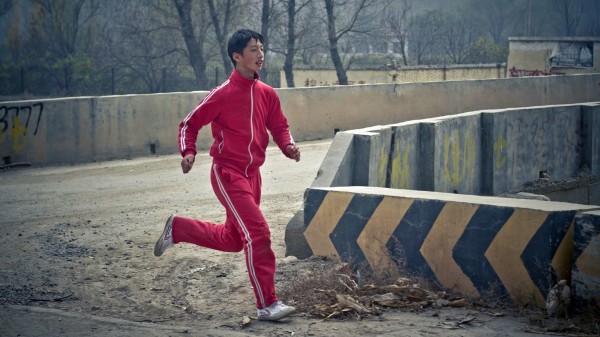
HOU YUNXIAO IN WUSHU ORPHAN
Yearnin' learnin'
In the late ’90s, the clean cut geeky Lu Youhong (Noah Jin) takes a first teaching job as the instructor in Chinese (to which maths and English are quickly added as faculty members defect) at the remote Zhige Wushu Academy for martial-arts for young boys. It's an arid environment for humanistic learning. The wushu lessons, intensely physical, leave little time or energy for book learning and that's okay with the headmaster. Moreover Lu isn't anybody special. He's gotten this job because he's the dean's nephew. The dean wants him to serve as a "catfish," stirring some life into the sluggish, bored other faculty members.
This is an atmospheric period piece that charms by reveling in the simple life of inland China more than two decades ago, when there are no computers or smart phones and you pay someone to use a local phone if you need to talk outside. The school buildings are big and old and rustic.
These boys in the early teens, all wearing identical red and white school sweat suits, are in fine shape, visible at shower time, an anonymous cast that seems to have been carefully screened for athletic talent. Their mass displays of uniformly choreographed martial arts moves led by harsh coach You Hu are impressive. This is an old fashioned tale of boarding school sufferings and life lessons. But this is a special place because 99% of the students live only for the dream of becoming another Bruce Lee, Jackie Chan or Jet Li.
Of young novice teacher Lu's many students, only one visibly cares about academics: Zhang Cuishan (Hou Yunxiao), who excels at schoolwork but hates martial arts and tries to run away all the time, getting caught on one of his escapes in fact on the very day of Lu's arrival - by bicycle - the way most people got around in China before the industrial capitalist boom time came. As Lu tries to form a protective bond with the bullied Zhang, whose parents live on a boat and have sent him away because he can't swim, he also develops a crush on the school’s pretty young doctor An Lan and receives insider tips and wisdom from the principal’s quirky grown son Jiang Qin, who ranks lower in his father's eyes than his beloved pet falcon. Jiang Qin likes to chew gum and smoke. He's a slacker who hangs around at the school, out of favor with his father but ever present on the fringes.
There is also an elderly marshal arts guru, a distinguished-looking Mr. Miyagi type with goatee and eyepatch, who wanders the country looking for opponents. Only later in this longish two-hour film does this season-marking subplot make sense. Huang Huang's movie, simple and crowd-pleasing but ambitious in its way, almost wants to be a TV miniseries, the director seeming as enthusiastic and willing to take on additional subjects as his young schoolteacher protagonist.
Whushu Orphan 武林孤儿, 120 mins., premiered at the 31st Tokyo International Film Festival, where Huang Huang was awarded the Spirit of Asia Award for a promising new director presented in the Asian Future section. Reviewed in Asian Movie Pulse.
TRAILER
Sunday, June 30
8:30 PM
Walter Reade Theater
Last edited by Chris Knipp; 06-23-2019 at 08:16 PM.
-
THE SCOUNDRELS 狂徒 (Hung Tzu-Hsuan 2018)
HUNG TZU-HSUAN: THE SCOUNDRELS 狂徒 (2018)
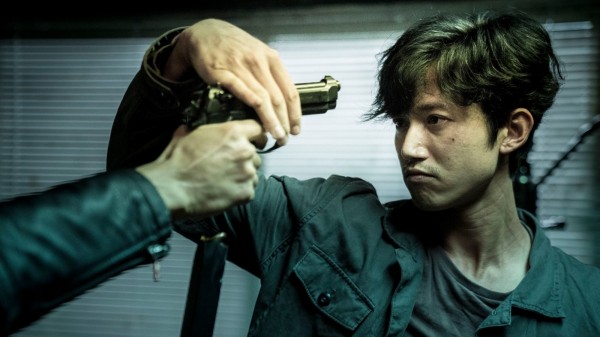
WU KANG-REN IN THE SCOUNDRELS
The mayhem and the speculation
It would seem strange for a fan of Edward Yang and Ho Hsiau Hsien to think of a violent crime movie out of Taiwan, but a story from Vancouver dated less than two weeks ago is headlined "Crime dramas dominate this year’s Taiwanese Film Festival." So there you are. One title listed, strangely, is from 2017 and was in last year's NYAFF, The Bold, the Corrupt, and the Beautiful - but that's because it's the Taiwanese Film Festival of Vancouver. A brief but knowledgeable review of The Scoundrels comes from LP Hugo of Asian Film Strike, a young Parisian who writes in impeccable English and who's clearly a big fan of Asian actioners.
The Scoundrels is an actioner, alright. In fact you have to sift through the nearly nonstop violence of the first twenty minutes to locate the plot elements, in particular a protagonist, Ray (aka Rui aka Liao Wen-jui) (JC Lin), who's a pro basketball player so disgraced after he beats up a member of the crowd in a terrible fit of anger during a game that he's not allowed to play ever again, and, because his debt to the injured party leaves him broke, drifts into servile tasks for a crime boss, setting up hits for a sophisticated car theft ring.
Through an attempt to do good that goes awry, he becomes the sidekick of the anonymous Raincoat Robber aka Ben / Wu Shun-Wei (Wu Kang-Ren). This relationship between Ray Ben LP Hugo calls a "love/hate bromance," and once it gets going and one has gotten used to the high speed, adrenaline-drenched action, things start to make sense, though Elizabeth Kerr is right her in Hollywood Reporter when she says this film "zips by so economically there’s no time to register its flaws." That's part of what's going on.
The NYAFF blurb explains that /Ray has been "hijacked and framed for robbery" while he is "trying to help an injured woman." The robbery he's framed for was done by the Raincoat Robber. The latter stops Ray from helping the woman to escape in a car driven by him, and it's thus that Ray gets drawn into what the blurb calls "a downward spiral of crime, treachery, and violence." And then you realize this idea of a Raincoat Robber, who holds up armored cars wearing a motorcycle helmet and raincoat, in heavy rain, is another way of inducing a heavy dramatic mood in scenes where the viewer also can't make out all the details. LP Hugo unintentionally points to another flaw when he describes Ray and Ben respectively as "coarsely juvenile" and an "amoral cipher." Their volatile, shifting relationship may be interesting, but they're not very worthy of our time otherwise.
We join the obligatory young-old cop duo, chatting in a car, at thirty minutes. They go to the hospital to interview the injured woman. This interlude provides a rather overdue interlude of relative quiet. But their roles are vastly overwhelmed by the mayhem perpetrated by Ray and Ben, first acting as a team, in gang boss Hsiao-Hei's gambling den trying to get some money back. The Ray/Ben action goes too fast, and the two-cop one goes too slow. Another thread involves Shin-jei (Chien-Na Lee), Ray's former girlfriend, a physiotherapist.
The interesting thing about this film is that while some people are quietly trying o figure out what happened, we're also following Ray and Ben's evolving relationship and eventual partnership in crime, so what happened becomes irrelevant. And there is a real and structurally nice contrast between the mayhem and the speculation about it. However the end is in mayhem and violence and a grimly ironic finale that gives a sense of an ending, yet is absurd. Well done, one must admit, for someone who previously made only short films.
The Scoundrels 狂徒 (Kuang tu), 105 mins., debuted at Busan Oct. 8, 2018 and also showed in Oct. 2018 at Kaohsiung and BAFICI - Buenos Aires. Screened for this review as part of the NYAFF.
Monday, July 1
6:00 PM
Walter Reade Theater
Last edited by Chris Knipp; 06-26-2019 at 09:24 AM.
-
COMPLICITY (Kei Chikaura 2018)
KEI CHIKAURA: COMPLICITY (2018)
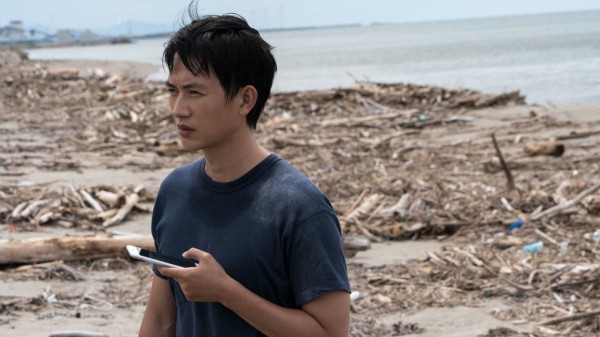
LU YULAI IN COMPLICITY
Being Chinese in Japan
In this painfully touching tale of illegal immigration, Chen Liang (Lu Yulai, in an intimate, committed performance), is a young Chinese man burdened with debts after the death of his father. He becomes "Liu Wei" when he takes on a false identity to seize a job opportunity in Japan, hoping to return with a pile and restart his dad's garage. Immigrant labor is much needed for Japan's aging population, yet foreigners aren't welcome in Japan, and there is a continual threat of deportation if Chen's false identity is discovered. It was not the wisest financial decision to move to a country not only resistant to foreigners but long economically stagnant. Chen/Liu was, obviously, spurred by optimistic rumors. Yet he takes to his new life with a quiet passion that makes its frailty heartbreaking.
Flashbacks show what it was like living with his sick mother and poisonous grandmother before he leaves. Selling stolen water heaters with some others is how he makes up the money to pay for his smuggler and fake ID papers when first arrived in Japan. He buys the latter on the black market, then takes the job, offered to the original owner of the phone number, without knowing what it'll be. Soon he is apprenticing in a rural soba shop, lugging huge bags of grain, cleaning up and politely serving at table, and most importantly being shown the trade by a fatherly old man. Unlike the others who were buying fake ID's with him, who go into shifty work under the radar, Chen's job is perfectly legitimate. He is terribly sincere to, and treated extremely kindly by, his rural Japanese employers, save for the fact that he is lying to them about who he is. Whatever structural weaknesses Chicaura's film may have (it can seem meandering and prolix at times), he makes his protagonist's complex, stressful situation intensely clear and emotionally vivid for us.
They give him a low-ceilinged room upstairs, scrupulously clean, and treat him like family, though understanding Japanese may be a struggle for him. What's said to him is translated in subtitles for us; how much he gets isn't always altogether clear, but he seems to follow quite a lot even if he doesn't talk much.
The immigrant is a nice looking, low-keyed guy and he not only bonds with his soba chef boss Hiroshi Inoue (Tatsuya Fuji of In the Realm of Senses) but also with Hazuki (Sayo Akasaka), an artistic young women he meets through delivering a meal to her studio on the edge of a beautiful forest - who takes to him immediately. She has been learning Chinese, so they can communicate, though the more wordless communication with Hiroshi seems just as intense. Part of Chen's bonding with Horoshi turns out to be shared opposition to the son's stubborn desire to close the restaurant. In one fraught scene where the son comes to visit with his wife, Chen/Liu's "complicity" as a near-family member in the house becomes clear.
How would Ozu have treated this subject? The scene where sister and her visiting brother fight loudly in one room and Chen putters around in another listening and looking worried, is the most powerful and strangely intimate moment in the first half of the film. Later, when authorities suspect that Liu is Chen, the other meaning of "complicity" appears as the relationship between the young immigrant and his soba chef "dad" deepens.
Kei Chikaura’s aim in his feature debut is to perform an act of sympathy, providing insight into an experience rarely observed on screen. This story doesn't depict moving from one conflict zone into another like Jacques Audiard's Palme d'Or-winning 2015 Dheepan. Chikaura need not go to such an extreme. He succeeds by staying close to its protagonist, following him up and down stairs, even calling out attention to the various T shirts he wears and how he adjusts the fan in his attic room. A little more detailed sense of Chen's personal motivations for immigration would have improved the writing, especially since the screenplay focuses on Chen/Liu's private experience much more than on political issues and has numerous little flashbacks, some of them unnecessary. But the intimacy and emotional closeness to the protagonist make a strong impression.
Kei Chikaura started a career as a filmmaker with his first short film Empty House in 2013. His second, The Lasting Persimmon, was selected for the Clermont- Ferrand International Short Film Festival in 2016. In 2017, his third short film Signature, which focused on a Chinese immigrant and featured the same lead actor, premiered at Locarno.
In fact Chikaura, coming from shorts to a feature, seems trying to include too much and having trouble integrating different elements - the grim details of illegal immigration, the sudden intimacy in a family not one's own, and lighthearted and sentimentalized romantic moments with a semi-girlfriend don't quite mesh. This film could have used some sharpening up and paring down. But it also shows intense humanism and takes us pretty deeply into the world of its hopeful traveler.
Complicity コンプリシティ (katakana transliteration of "Complicity"), 115 mins., debuted at Toronto Sept. 2018 and also showed at Busan, Tokyo FILMeX, and the Berlinale Feb. 2019. Screened for this review as part of the NYAFF June 29, 2019. Asian Film Pulse review by Marko Stojilković, Eye for Film review by Jennie Kermonde, Windows on Worlds review by Hayley Scanlon, Moviebreak review by Lida Bach, Filmrezensionen review by Oliver Armknecht.
Saturday, June 29
1:00 PM
Walter Reade Theater
Last edited by Chris Knipp; 07-24-2019 at 11:01 AM.
-
THE FABLE (Ken Eguchi 2019)
KEN EGUCHI: THE FABLE (2019)
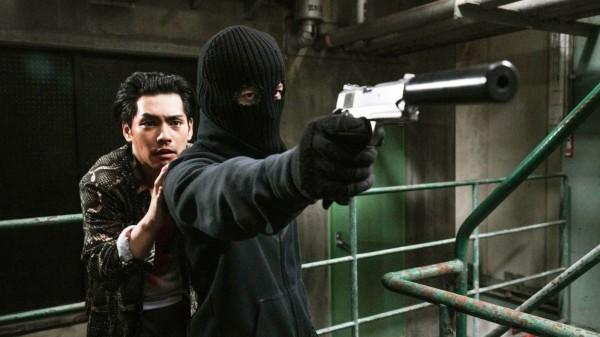
YUYA YAGIRA AND JUN'ICHI OKADA IN THE FABLE
Being "normal" is too difficult for a yakuza hit man
This wildly absurd, over-the-top gangster film (but aren't they all?) has just that extra edge of absurdity that is explained by one thing: it's from manga. The central figure, "the Fable," pronounced "za faburu", a legendary yakuza hit man whose existence some think is purely mythical till they find out otherwise, is Sato (Jun'ichi Okada), an ace, invincible professional killer put on leave by his boss (K˘ichi Sat˘). His orders are to act "normal" for one year, because his boss thinks "top assassins need that skill." Sato goes underground in Osaka (at first exaggeratedly imitating the rural Osaka accent) with his hotshot female sidekick. He starts dressing in casual, nondescript clothes. He is commanded to get a "normal" job. It's hard for him to find work because he refuses to pretend he likes any activity he might be hired to do. Finally Sato meets Misaki (Mizuki Yamamoto), a charming woman, who helps him work at a publisher as a handyman. There, he develops a new talent, raising his pay from 800 yen an hour to 900 (laughably little either way for a hit man), by doing childlike doodle-drawings that seem so charming to the boss because they "make people happy." These drawings indulge a kind of cuteness peculiar to the Japanese taste.
This film notably also notably contains Yűya Yagira, who won the Best Actor award at Cannes in 2004 at the uniquely young age of 14 for his first movie role n Hirakasu Koreeda's extraordinary Nobody Knows (誰も知らない Dare mo Shiranai). Here Yaqira takes the role of Kojima, a wild, absurdly egotistical and histrionic young gangster type just released from eight years in prison. The boss has trouble keeping Kojima in check, being, through much of the film, in the hospital for a stroke. (He has to have someone else keep an eye on Sato.) The boss has ordered Kojima to do nothing till he is up and about to watch over him. But that doesn't quite work. This story is about the need for control. Yagira's wild histrionics, his facial expressions and drawn out, comically menacing or chortling speech, help make this clear manga material and more a caricature of a gangster movie than a serious one.
Misaki has posed for "art" photos. When Kojima finds this out and starts trying to force her to pose for porn, she is in danger, and when Sato finds out about this, he cannot allow it. He is going to have to find a way of getting around his overlord's restrictions on his behavior. This finally leads to a prolonged sequence of violent martial arts action involving hand-to-hand combat and shooting. The movie is quite restrained till then, late in the game, it explodes into wild but carefully choreographed chaos on a network of railings and metal and concrete stairways. The sound of the bullets clatters deliciously and so does the click of feet on metal. All this is reportedly staged "by Jackie Clan's crew." The festival blurb concludes, "The Fable is a vibrant pastiche of kinetic storytelling, wry humor, nail-biting suspense, and hyperbolic action." It's kinda true, but you might enjoy this a lot more if you keep reminding yourself, "Forget it Jake, it's manga."
The original manga is by Katsuhisa Minami,the screenplay by Watanabe Yutsuke.
In his "normal" life Sato keeps a parakeet in his room, his only decoration, which reminded me of Alain Delon's canary in Jean-Pierre Melville's classic Le Samoura´ . But if Eguchi could achieve the iconic austerity of Melville, he'd have made quite another movie. I didn't even get to the legendary origin story of this chock-full film.
The Fable ザ・ファブル (kitagana transliteration for "Fable"), 125 mins., has four festival releases listed in June and July 2019, starting with Shanghai June 15, and including the NYAFF, where it was screened for this review.
NYFF showtime
Tuesday, July 2
6:00 PM
Walter Reade Theater
Last edited by Chris Knipp; 08-22-2021 at 09:43 AM.
-
IF YOU ARE HAPPY (Chen Xiaoming 2019)
CHEN XIAOMING: IF YOU ARE HAPPY 学区房72小时 (2019)
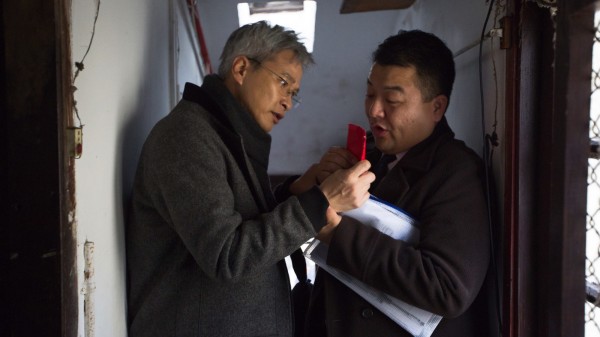
Bourgeois stress, Shanghai style
This film's ironic (English only) title comes from a relentlessly jaunty American kiddie song ("If you're happy and you know it, clap you hands"). That's what plays in Professor Fu's car, to feed his little girl English. She is in kindergarten but, welcome to the life of contemporary Shanghai yuppies: all focus is on preparing her for getting into the best schools. For getting ahead. And at the moment in this virtually real-time film progressing over less than a week, Prof. Fu's whole focus is on buying an apartment in the Huanuang distrct, where there's a good school for the child.
In the opening scene Fu looks at a classically shitty flat many flights up with dangling electrical wiring and a "view" of the school you have to climb up on a chair to see. He engages in virtual hand-to-hand combat with the crude realtor over whether he can have a chance at this dump, for which he must pay the equivalent of over $500K USD with a hefty cash down payment, more than he has, due almost immediately, or another buyer will snap it up.
In the course of the film Professor Fu shakily puts this project together, risking anything, including job, marriage, reputation, to do so. And then it all sort of falls apart again. Director Chen Xiaoming builds the action with tense, semi-vÚritÚ precipitousness that creates real tension for a while, but weakens his story with an indecisive finale partly suggesting regulations in China have now changed and all this might not make sense anymore.
In this venial depiction of contemporary China, everybody's after something so they can get ahead, and nobody cares much how they get it. Professor Fu's college students, with inadequate averages, are out to bribe him to change their grades. His and his wife's housekeeper "Auntie Niu" wants to get the Fus' nice apartment that he's willing to give up for a low price to get rapid cash, so her son can secure a residence in Shanghai that will enable him to marry. Fu didn't plan on that but accepts it as cash in hand. Later when the realtor tells Fu the price of the other apartment has gone up, he's quite willing to double-cross "Aunt."
Central to this high-class soap opera with a facade of social commentary is Professor Fu, present in every scene. He is a tall, stylish man with handsome salt-and-pepper hair and a little scarf knotted French-style. We see him making out with one of his girl students, a rich one, in his car. We see him wrestling with the "Aunt", with the realtor, with a lawyer, and with his weak, depressed wife. Rarely do we see him in in a classroom, but we see him repeatedly talking to a university official who warns him there are accusations of faculty bribe-taking which eventually turn out to be against him.
If You Are Happy may be vivid contemporary social commentary for Chinese viewers. A Chinese article says of the film that its "plot has accurately hit the anxiety of many Chinese parents today." But it fails to rise to the level of cinema achieved by a similar litigious drama that comes to mind, Asghar Farhadi's A Separation (NYFF 2011). Farhadi's film too has a telenovela quality, at first, anyway. But it is far more complex. In its rushed, precipitous action and limited time-scheme, If You Are Happy limits itself - to the narrow scope of its limited people. Nonetheless, as a slice of contemporary urban Chinese life, it provides a telling picture.
Chen Xiaoming worked as miscellaneous crew on Wong Kar-wai's Grandmaster in 2013. The cast features Guan Xuan, Xu Xing and Fu Wei.
If You Are Happy 学区房72小时 (School District 72 hours), 99 mins., was released in China June 28, 2019. It was screened for this review as part of the NYAFF.
NYAFF schowtime:
Wednesday, July 3
7:30 PM
Last edited by Chris Knipp; 06-27-2019 at 08:33 AM.
-
DARE TO STOP US 止められるか、俺たちを, (Kazuya Shiraishi 2018)
KAZUYA SHIRAISHI: DARE TO STOP US 止められるか、俺たちを(2018)
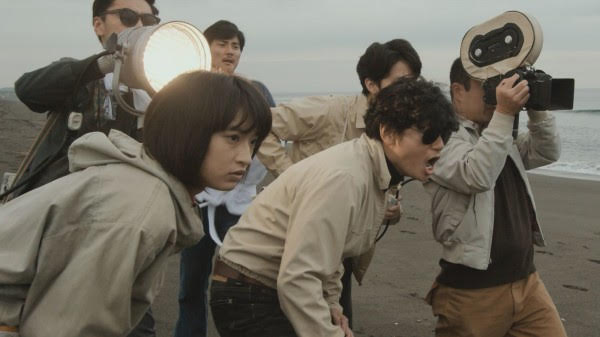
WAKAMATSU'S CREW AT WORK IN DARE TO STOP US; MEGUMI (MUGI KADAWAKI), LEFT
A radical Japanese movie company
Kōji Wakamatsu was a provocative Japanese film director who defies classification. He had been in the yakuza, and even as a filmmaker, gave free rein to an aggressive, provocative personality. His cinematic production ranged from softcore porn pinku eiga films like Ecstasy of the Angels and Go, Go, Second Time Virgin to films about revolution and the radical Palestinian PFLP. He also produced Nagisa Ōshima's famous shocker of radical sexuality In the Realm of the Senses. The porn ones themselves incorporated radical politics and radical aesthetics with the exploitation. This film about Wakamatsu, some of his key associates, and a young woman, struggles to convey this mixture which, for an American, may be hard to imagine, though there is a funky charm about the group dynamic.
The Sixties and Seventies were the most fertile period of Wakamatsu Productions, founded by revolutionary auteur Koji Wakamatsu (Caterpillar) and staffed (for free) with radical young artists like avant-garde filmmaker Masao Adachi, cinematographer Hideo Ito, and scriptwriter Arai (Kisetsu Fujiwara). Kazuya Shiraishi (The Blood of Wolves) himself got started making exploitation pictures at the company, now presents this raucous but fact-based account of one young dreamer Megumi (Mugi Kadowaki), who joins Wakamatsu in the spring of 1969 to make pinku eiga. She is somewhat at a loss, but sticks with whatever happens, except that she can't join in the company's radical political action. As she struggles to fit into the testosterone-heavy "family" and find her own voice, Megumi’s life becomes equal parts masculine and feminine, and over time, heroic and tragic. After she becomes pregnant by the company's still photographer Takama (Ku Ijima), Megumi's psychological instability and painful family background come forward.
One early Wakamatsu pinku eiga was Taiji ga mitsuryo suru toki ("The Embryo Hunts in Secret," 1966), in which a woman is sexually enslaved by her boss, and the 1969 Yuke yuke nidome no shojo ("Go, Go Second Time Virgin"), featured in this film. Wakamatsu co-directed, with Masao Adachi, a 1971 documentary about the People's Front for the Liberation of Palestine. His later films included the docudrama Jitsuroku Rengo Sekigun: Asama sanso e no michi (2007; United Red Army), which was screened at the Berlin International Film Festival and the Tokyo International Film Festival; Kyatapira ("Caterpillar," 2010), nominated for a Golden Bear at Berlin; and 11.25 jiketsu no hi : Mishima Yukio to wakamono-tachi (2012; 11.25: The Day He Chose His Own Fate), a biography of novelist Yukio Mishima shown at Cannes (referred to in this film), and Sennen no yuraku ("Millennial Rapture"), premiered at the Venice in 2012. Wakamatsu was named Asian Filmmaker of the Year at Busan in 2012.
At the time of his death in a traffic accident at 76 Wakamatsu was returning from a meeting for his latest project, focused on Japan's nuclear industry lobby and the Tokyo-based TEPCO company. The topical subject matter followed on the heels of the Fukushima nuclear disaster.
There's a discussion of Shraishi's film by Mark Shilling in The Japan Times (October 2018). Shilling met Wakamatsu several times and says "He was feisty and outspoken, but his sense of mission also struck me. He saw himself as a truth-telling guerrilla in a business, society and world dedicated to peddling convenient lies."
Dare to Stop Us is a movie about a group, and about intense working friendships, bull sessions, getting drunk together, and a lot of cigarette smoking. It's about personalities hanging out. They're presented jokily at first, but as the enterprise gains credibility, are seen in a more serious light. There's an old-shoe quality about many of the scenes that is very appealing. The main characters, even the brusque Wakamatsu himself (Arata Iura), come forward and become attractive, not only Arai (Kisetsu Fujiwara) and Megumi (Mugi Kadawaki) but the soulful Takima (Ku Ijima), who winds up as Megumi's bed partner, and various others. Nonetheless something may be lost in the subtitles in this largely understated and unclassifiale film. Shiraishi is trying to catch lightening in a bottle. How well he captures it may elude the non-native viewer.
Dare to Stop Us 止められるか、俺たちを, 119 mins., debuted in Japan Oct. 13, 2018 after an Oct. 5 premiere at Busan. It has been in at least five other film festivals including the NYAFF, where it was screened for this review.
NYAFF showtime:
Showtimes
Thursday, July 4
3:00 PM
Last edited by Chris Knipp; 06-29-2019 at 04:52 PM.
 Posting Permissions
Posting Permissions
- You may not post new threads
- You may not post replies
- You may not post attachments
- You may not edit your posts
-
Forum Rules







 Reply With Quote
Reply With Quote






Bookmarks